Business Law Analysis
VerifiedAdded on 2020/03/16
|12
|2547
|36
Report
AI Summary
This report analyzes the contractual capacity of companies and the duties of directors under the Corporation Act 2001 (Cth). It discusses specific cases and legal provisions, providing insights into the responsibilities and liabilities of directors in corporate governance.
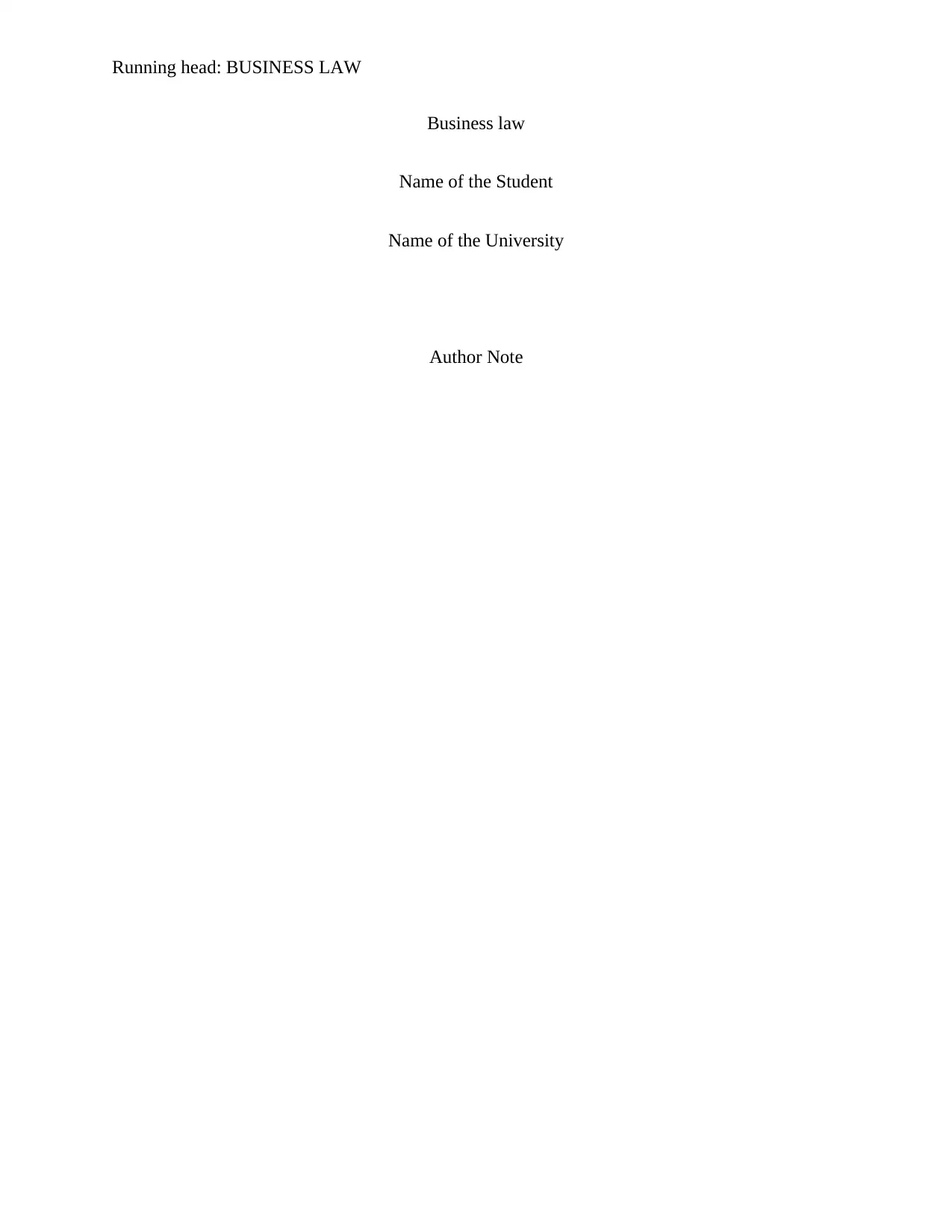
Running head: BUSINESS LAW
Business law
Name of the Student
Name of the University
Author Note
Business law
Name of the Student
Name of the University
Author Note
Paraphrase This Document
Need a fresh take? Get an instant paraphrase of this document with our AI Paraphraser
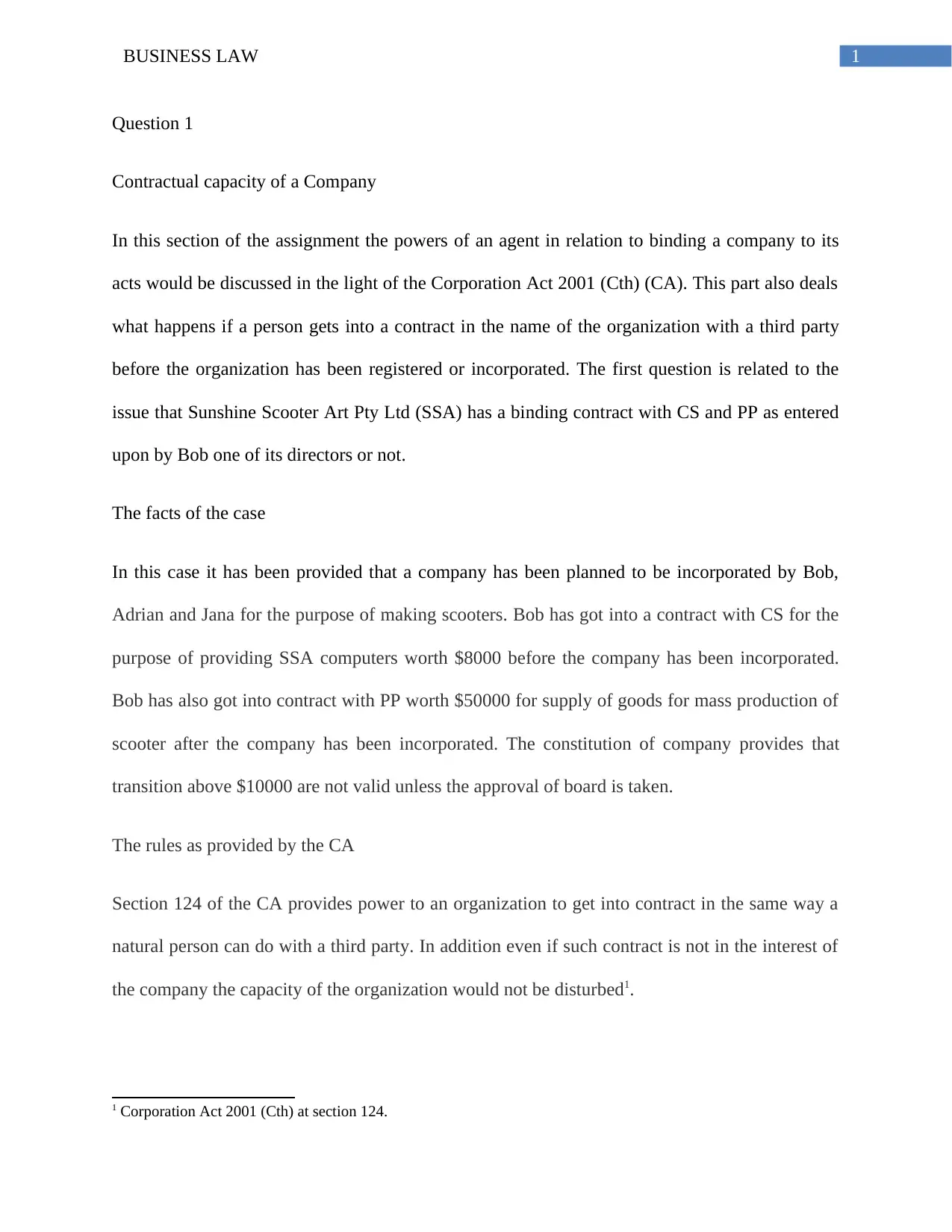
1BUSINESS LAW
Question 1
Contractual capacity of a Company
In this section of the assignment the powers of an agent in relation to binding a company to its
acts would be discussed in the light of the Corporation Act 2001 (Cth) (CA). This part also deals
what happens if a person gets into a contract in the name of the organization with a third party
before the organization has been registered or incorporated. The first question is related to the
issue that Sunshine Scooter Art Pty Ltd (SSA) has a binding contract with CS and PP as entered
upon by Bob one of its directors or not.
The facts of the case
In this case it has been provided that a company has been planned to be incorporated by Bob,
Adrian and Jana for the purpose of making scooters. Bob has got into a contract with CS for the
purpose of providing SSA computers worth $8000 before the company has been incorporated.
Bob has also got into contract with PP worth $50000 for supply of goods for mass production of
scooter after the company has been incorporated. The constitution of company provides that
transition above $10000 are not valid unless the approval of board is taken.
The rules as provided by the CA
Section 124 of the CA provides power to an organization to get into contract in the same way a
natural person can do with a third party. In addition even if such contract is not in the interest of
the company the capacity of the organization would not be disturbed1.
1 Corporation Act 2001 (Cth) at section 124.
Question 1
Contractual capacity of a Company
In this section of the assignment the powers of an agent in relation to binding a company to its
acts would be discussed in the light of the Corporation Act 2001 (Cth) (CA). This part also deals
what happens if a person gets into a contract in the name of the organization with a third party
before the organization has been registered or incorporated. The first question is related to the
issue that Sunshine Scooter Art Pty Ltd (SSA) has a binding contract with CS and PP as entered
upon by Bob one of its directors or not.
The facts of the case
In this case it has been provided that a company has been planned to be incorporated by Bob,
Adrian and Jana for the purpose of making scooters. Bob has got into a contract with CS for the
purpose of providing SSA computers worth $8000 before the company has been incorporated.
Bob has also got into contract with PP worth $50000 for supply of goods for mass production of
scooter after the company has been incorporated. The constitution of company provides that
transition above $10000 are not valid unless the approval of board is taken.
The rules as provided by the CA
Section 124 of the CA provides power to an organization to get into contract in the same way a
natural person can do with a third party. In addition even if such contract is not in the interest of
the company the capacity of the organization would not be disturbed1.
1 Corporation Act 2001 (Cth) at section 124.
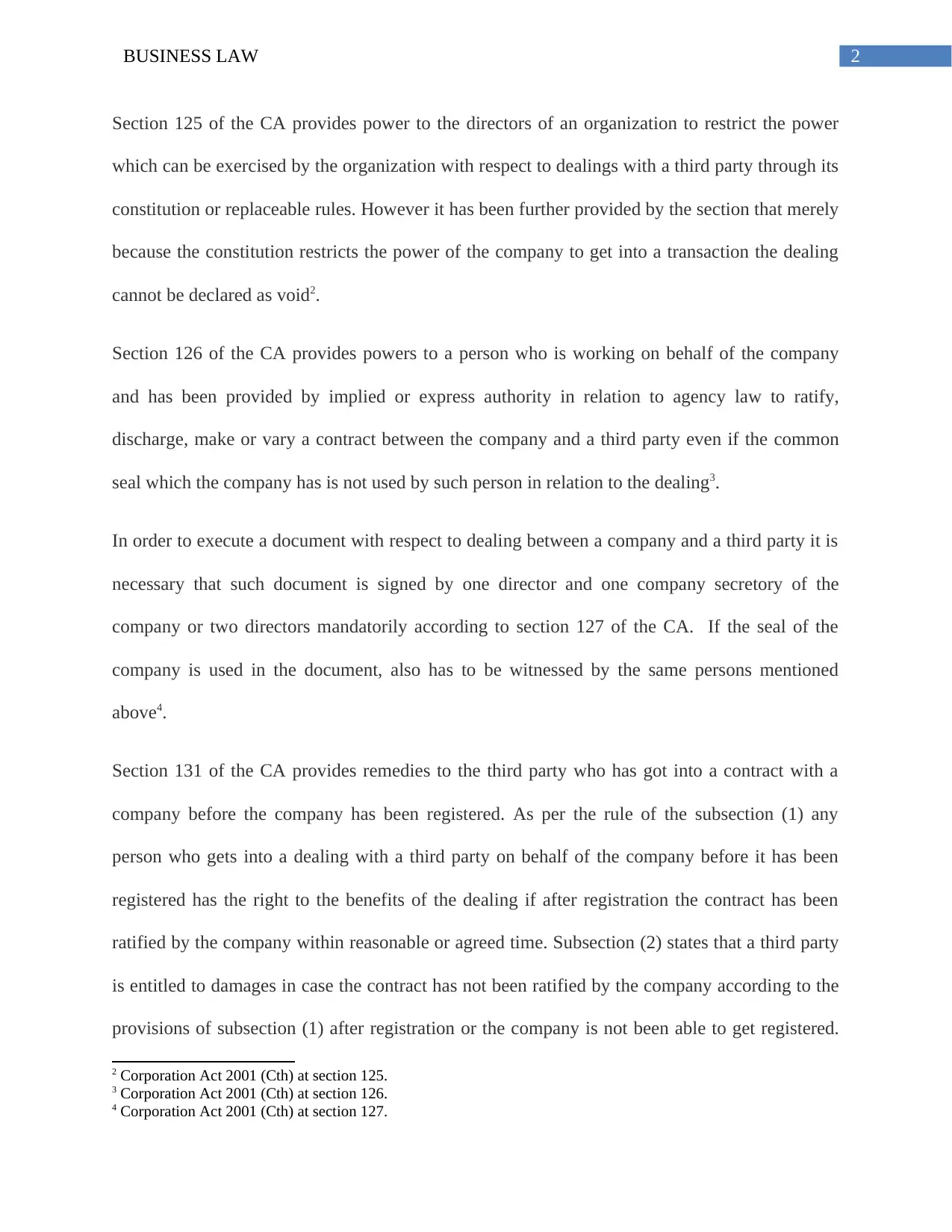
2BUSINESS LAW
Section 125 of the CA provides power to the directors of an organization to restrict the power
which can be exercised by the organization with respect to dealings with a third party through its
constitution or replaceable rules. However it has been further provided by the section that merely
because the constitution restricts the power of the company to get into a transaction the dealing
cannot be declared as void2.
Section 126 of the CA provides powers to a person who is working on behalf of the company
and has been provided by implied or express authority in relation to agency law to ratify,
discharge, make or vary a contract between the company and a third party even if the common
seal which the company has is not used by such person in relation to the dealing3.
In order to execute a document with respect to dealing between a company and a third party it is
necessary that such document is signed by one director and one company secretory of the
company or two directors mandatorily according to section 127 of the CA. If the seal of the
company is used in the document, also has to be witnessed by the same persons mentioned
above4.
Section 131 of the CA provides remedies to the third party who has got into a contract with a
company before the company has been registered. As per the rule of the subsection (1) any
person who gets into a dealing with a third party on behalf of the company before it has been
registered has the right to the benefits of the dealing if after registration the contract has been
ratified by the company within reasonable or agreed time. Subsection (2) states that a third party
is entitled to damages in case the contract has not been ratified by the company according to the
provisions of subsection (1) after registration or the company is not been able to get registered.
2 Corporation Act 2001 (Cth) at section 125.
3 Corporation Act 2001 (Cth) at section 126.
4 Corporation Act 2001 (Cth) at section 127.
Section 125 of the CA provides power to the directors of an organization to restrict the power
which can be exercised by the organization with respect to dealings with a third party through its
constitution or replaceable rules. However it has been further provided by the section that merely
because the constitution restricts the power of the company to get into a transaction the dealing
cannot be declared as void2.
Section 126 of the CA provides powers to a person who is working on behalf of the company
and has been provided by implied or express authority in relation to agency law to ratify,
discharge, make or vary a contract between the company and a third party even if the common
seal which the company has is not used by such person in relation to the dealing3.
In order to execute a document with respect to dealing between a company and a third party it is
necessary that such document is signed by one director and one company secretory of the
company or two directors mandatorily according to section 127 of the CA. If the seal of the
company is used in the document, also has to be witnessed by the same persons mentioned
above4.
Section 131 of the CA provides remedies to the third party who has got into a contract with a
company before the company has been registered. As per the rule of the subsection (1) any
person who gets into a dealing with a third party on behalf of the company before it has been
registered has the right to the benefits of the dealing if after registration the contract has been
ratified by the company within reasonable or agreed time. Subsection (2) states that a third party
is entitled to damages in case the contract has not been ratified by the company according to the
provisions of subsection (1) after registration or the company is not been able to get registered.
2 Corporation Act 2001 (Cth) at section 125.
3 Corporation Act 2001 (Cth) at section 126.
4 Corporation Act 2001 (Cth) at section 127.
⊘ This is a preview!⊘
Do you want full access?
Subscribe today to unlock all pages.

Trusted by 1+ million students worldwide
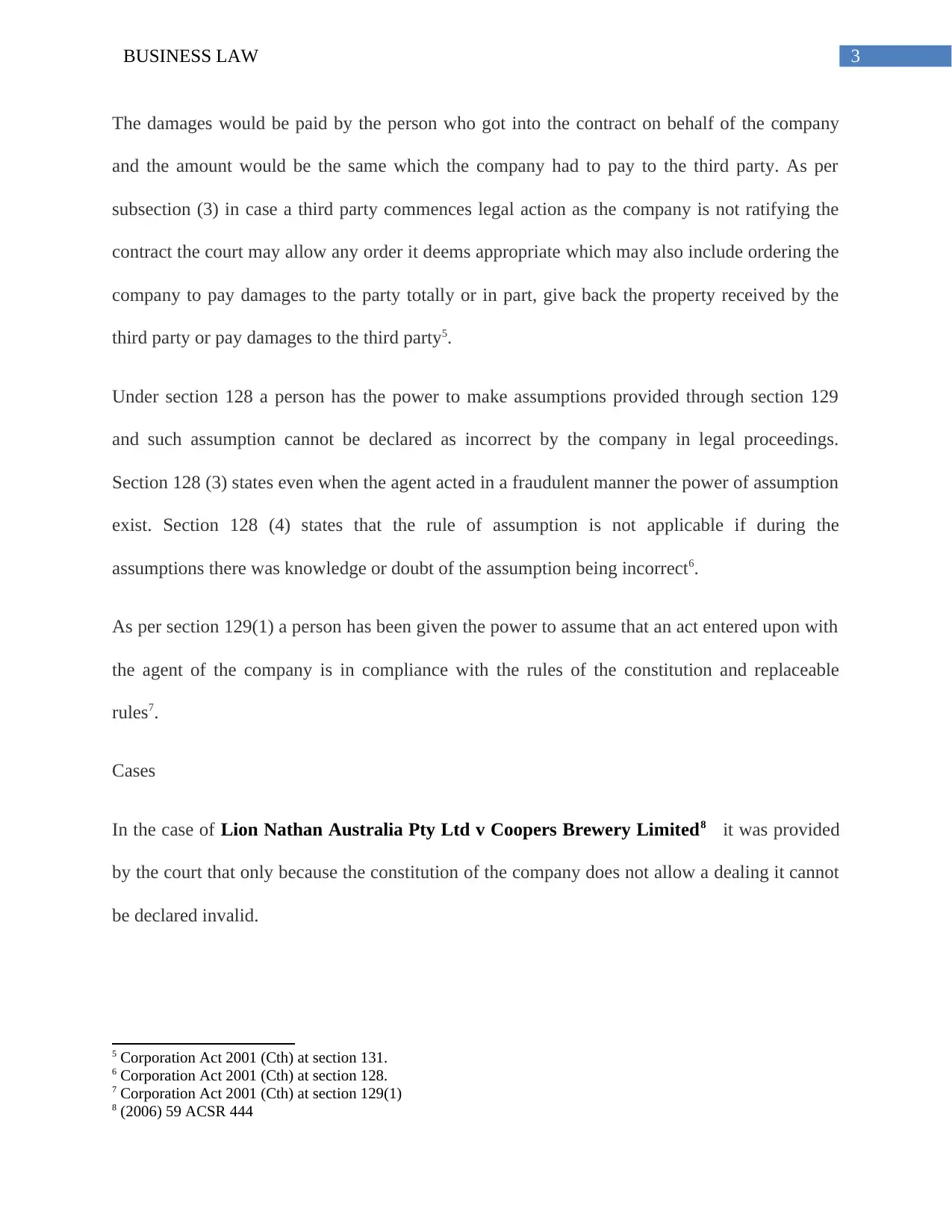
3BUSINESS LAW
The damages would be paid by the person who got into the contract on behalf of the company
and the amount would be the same which the company had to pay to the third party. As per
subsection (3) in case a third party commences legal action as the company is not ratifying the
contract the court may allow any order it deems appropriate which may also include ordering the
company to pay damages to the party totally or in part, give back the property received by the
third party or pay damages to the third party5.
Under section 128 a person has the power to make assumptions provided through section 129
and such assumption cannot be declared as incorrect by the company in legal proceedings.
Section 128 (3) states even when the agent acted in a fraudulent manner the power of assumption
exist. Section 128 (4) states that the rule of assumption is not applicable if during the
assumptions there was knowledge or doubt of the assumption being incorrect6.
As per section 129(1) a person has been given the power to assume that an act entered upon with
the agent of the company is in compliance with the rules of the constitution and replaceable
rules7.
Cases
In the case of Lion Nathan Australia Pty Ltd v Coopers Brewery Limited8 it was provided
by the court that only because the constitution of the company does not allow a dealing it cannot
be declared invalid.
5 Corporation Act 2001 (Cth) at section 131.
6 Corporation Act 2001 (Cth) at section 128.
7 Corporation Act 2001 (Cth) at section 129(1)
8 (2006) 59 ACSR 444
The damages would be paid by the person who got into the contract on behalf of the company
and the amount would be the same which the company had to pay to the third party. As per
subsection (3) in case a third party commences legal action as the company is not ratifying the
contract the court may allow any order it deems appropriate which may also include ordering the
company to pay damages to the party totally or in part, give back the property received by the
third party or pay damages to the third party5.
Under section 128 a person has the power to make assumptions provided through section 129
and such assumption cannot be declared as incorrect by the company in legal proceedings.
Section 128 (3) states even when the agent acted in a fraudulent manner the power of assumption
exist. Section 128 (4) states that the rule of assumption is not applicable if during the
assumptions there was knowledge or doubt of the assumption being incorrect6.
As per section 129(1) a person has been given the power to assume that an act entered upon with
the agent of the company is in compliance with the rules of the constitution and replaceable
rules7.
Cases
In the case of Lion Nathan Australia Pty Ltd v Coopers Brewery Limited8 it was provided
by the court that only because the constitution of the company does not allow a dealing it cannot
be declared invalid.
5 Corporation Act 2001 (Cth) at section 131.
6 Corporation Act 2001 (Cth) at section 128.
7 Corporation Act 2001 (Cth) at section 129(1)
8 (2006) 59 ACSR 444
Paraphrase This Document
Need a fresh take? Get an instant paraphrase of this document with our AI Paraphraser
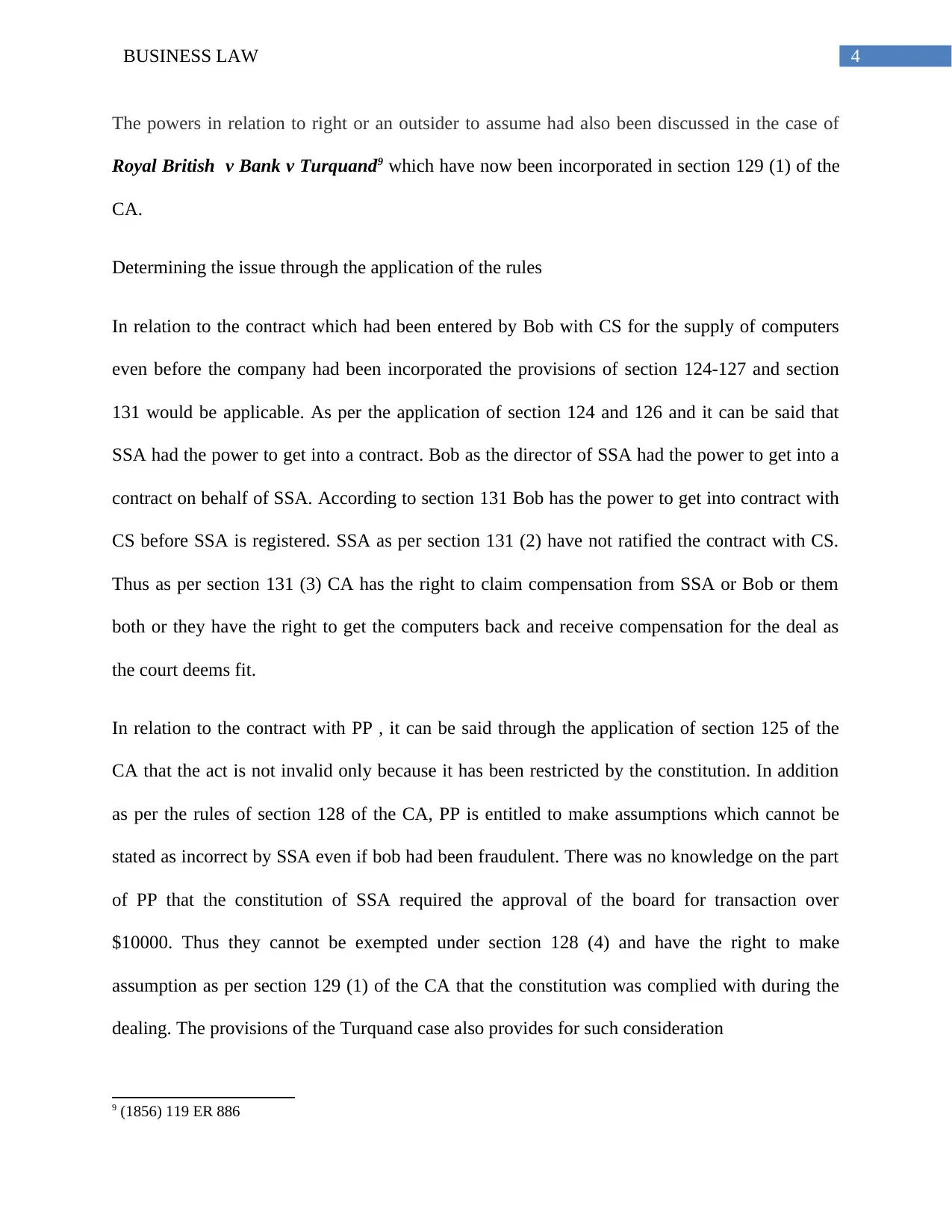
4BUSINESS LAW
The powers in relation to right or an outsider to assume had also been discussed in the case of
Royal British v Bank v Turquand9 which have now been incorporated in section 129 (1) of the
CA.
Determining the issue through the application of the rules
In relation to the contract which had been entered by Bob with CS for the supply of computers
even before the company had been incorporated the provisions of section 124-127 and section
131 would be applicable. As per the application of section 124 and 126 and it can be said that
SSA had the power to get into a contract. Bob as the director of SSA had the power to get into a
contract on behalf of SSA. According to section 131 Bob has the power to get into contract with
CS before SSA is registered. SSA as per section 131 (2) have not ratified the contract with CS.
Thus as per section 131 (3) CA has the right to claim compensation from SSA or Bob or them
both or they have the right to get the computers back and receive compensation for the deal as
the court deems fit.
In relation to the contract with PP , it can be said through the application of section 125 of the
CA that the act is not invalid only because it has been restricted by the constitution. In addition
as per the rules of section 128 of the CA, PP is entitled to make assumptions which cannot be
stated as incorrect by SSA even if bob had been fraudulent. There was no knowledge on the part
of PP that the constitution of SSA required the approval of the board for transaction over
$10000. Thus they cannot be exempted under section 128 (4) and have the right to make
assumption as per section 129 (1) of the CA that the constitution was complied with during the
dealing. The provisions of the Turquand case also provides for such consideration
9 (1856) 119 ER 886
The powers in relation to right or an outsider to assume had also been discussed in the case of
Royal British v Bank v Turquand9 which have now been incorporated in section 129 (1) of the
CA.
Determining the issue through the application of the rules
In relation to the contract which had been entered by Bob with CS for the supply of computers
even before the company had been incorporated the provisions of section 124-127 and section
131 would be applicable. As per the application of section 124 and 126 and it can be said that
SSA had the power to get into a contract. Bob as the director of SSA had the power to get into a
contract on behalf of SSA. According to section 131 Bob has the power to get into contract with
CS before SSA is registered. SSA as per section 131 (2) have not ratified the contract with CS.
Thus as per section 131 (3) CA has the right to claim compensation from SSA or Bob or them
both or they have the right to get the computers back and receive compensation for the deal as
the court deems fit.
In relation to the contract with PP , it can be said through the application of section 125 of the
CA that the act is not invalid only because it has been restricted by the constitution. In addition
as per the rules of section 128 of the CA, PP is entitled to make assumptions which cannot be
stated as incorrect by SSA even if bob had been fraudulent. There was no knowledge on the part
of PP that the constitution of SSA required the approval of the board for transaction over
$10000. Thus they cannot be exempted under section 128 (4) and have the right to make
assumption as per section 129 (1) of the CA that the constitution was complied with during the
dealing. The provisions of the Turquand case also provides for such consideration
9 (1856) 119 ER 886
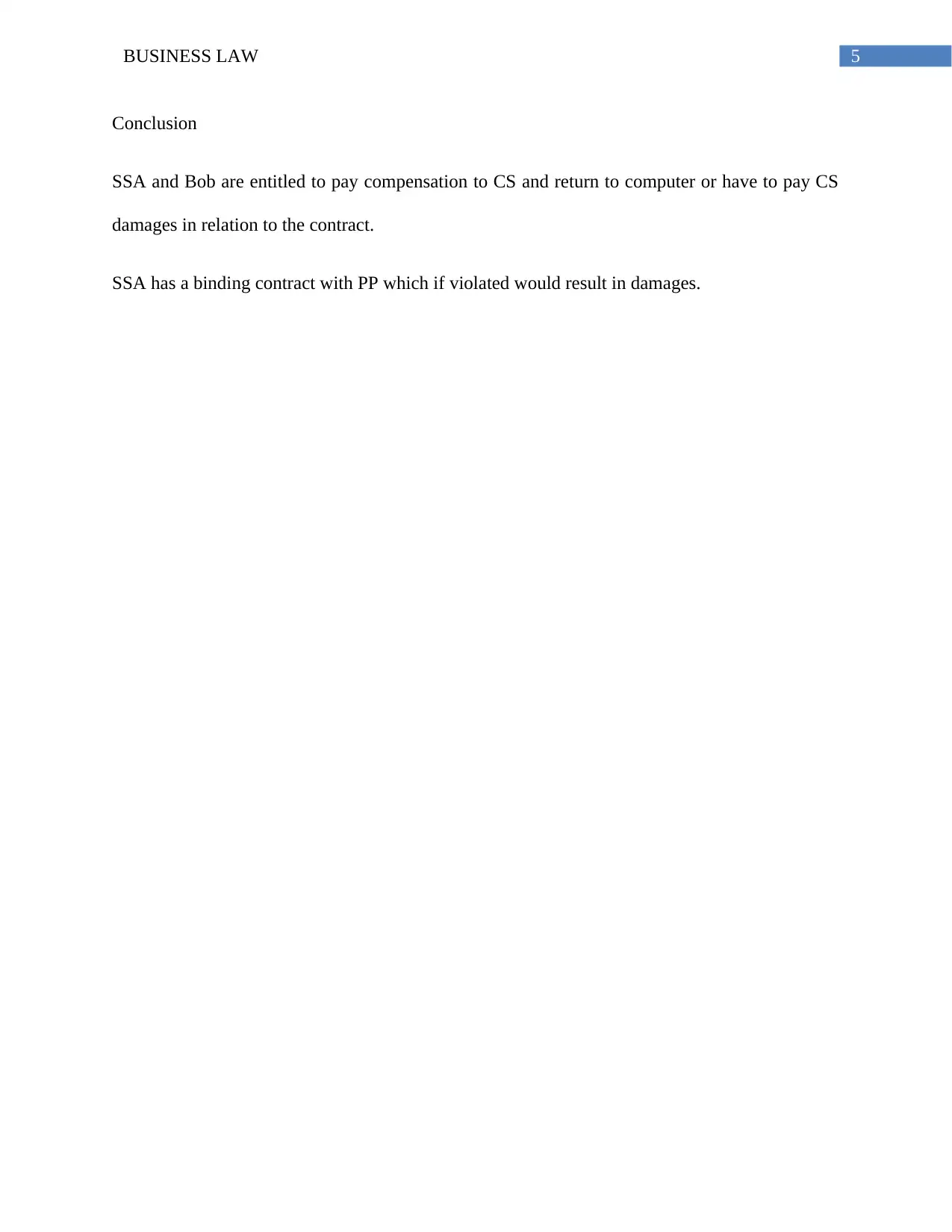
5BUSINESS LAW
Conclusion
SSA and Bob are entitled to pay compensation to CS and return to computer or have to pay CS
damages in relation to the contract.
SSA has a binding contract with PP which if violated would result in damages.
Conclusion
SSA and Bob are entitled to pay compensation to CS and return to computer or have to pay CS
damages in relation to the contract.
SSA has a binding contract with PP which if violated would result in damages.
⊘ This is a preview!⊘
Do you want full access?
Subscribe today to unlock all pages.

Trusted by 1+ million students worldwide
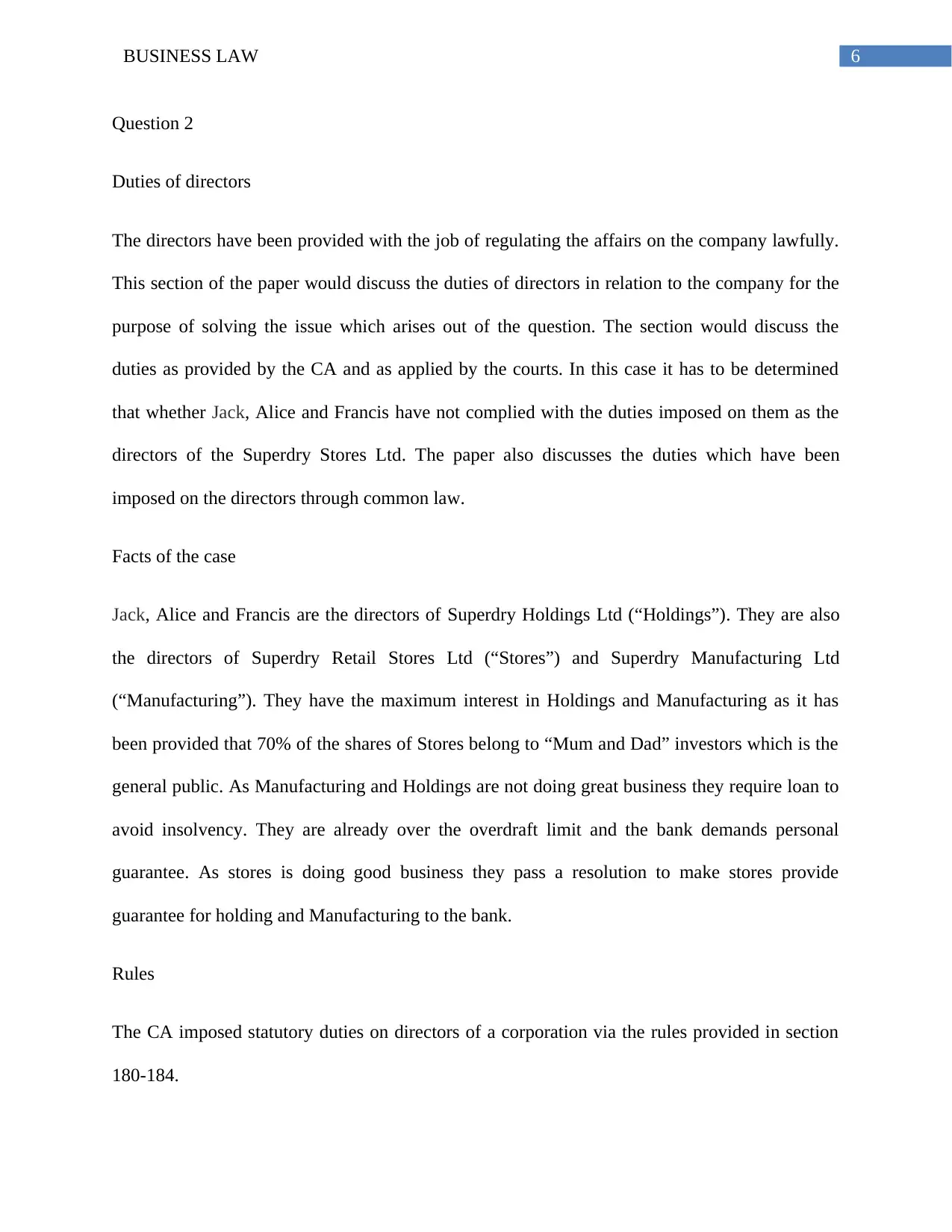
6BUSINESS LAW
Question 2
Duties of directors
The directors have been provided with the job of regulating the affairs on the company lawfully.
This section of the paper would discuss the duties of directors in relation to the company for the
purpose of solving the issue which arises out of the question. The section would discuss the
duties as provided by the CA and as applied by the courts. In this case it has to be determined
that whether Jack, Alice and Francis have not complied with the duties imposed on them as the
directors of the Superdry Stores Ltd. The paper also discusses the duties which have been
imposed on the directors through common law.
Facts of the case
Jack, Alice and Francis are the directors of Superdry Holdings Ltd (“Holdings”). They are also
the directors of Superdry Retail Stores Ltd (“Stores”) and Superdry Manufacturing Ltd
(“Manufacturing”). They have the maximum interest in Holdings and Manufacturing as it has
been provided that 70% of the shares of Stores belong to “Mum and Dad” investors which is the
general public. As Manufacturing and Holdings are not doing great business they require loan to
avoid insolvency. They are already over the overdraft limit and the bank demands personal
guarantee. As stores is doing good business they pass a resolution to make stores provide
guarantee for holding and Manufacturing to the bank.
Rules
The CA imposed statutory duties on directors of a corporation via the rules provided in section
180-184.
Question 2
Duties of directors
The directors have been provided with the job of regulating the affairs on the company lawfully.
This section of the paper would discuss the duties of directors in relation to the company for the
purpose of solving the issue which arises out of the question. The section would discuss the
duties as provided by the CA and as applied by the courts. In this case it has to be determined
that whether Jack, Alice and Francis have not complied with the duties imposed on them as the
directors of the Superdry Stores Ltd. The paper also discusses the duties which have been
imposed on the directors through common law.
Facts of the case
Jack, Alice and Francis are the directors of Superdry Holdings Ltd (“Holdings”). They are also
the directors of Superdry Retail Stores Ltd (“Stores”) and Superdry Manufacturing Ltd
(“Manufacturing”). They have the maximum interest in Holdings and Manufacturing as it has
been provided that 70% of the shares of Stores belong to “Mum and Dad” investors which is the
general public. As Manufacturing and Holdings are not doing great business they require loan to
avoid insolvency. They are already over the overdraft limit and the bank demands personal
guarantee. As stores is doing good business they pass a resolution to make stores provide
guarantee for holding and Manufacturing to the bank.
Rules
The CA imposed statutory duties on directors of a corporation via the rules provided in section
180-184.
Paraphrase This Document
Need a fresh take? Get an instant paraphrase of this document with our AI Paraphraser
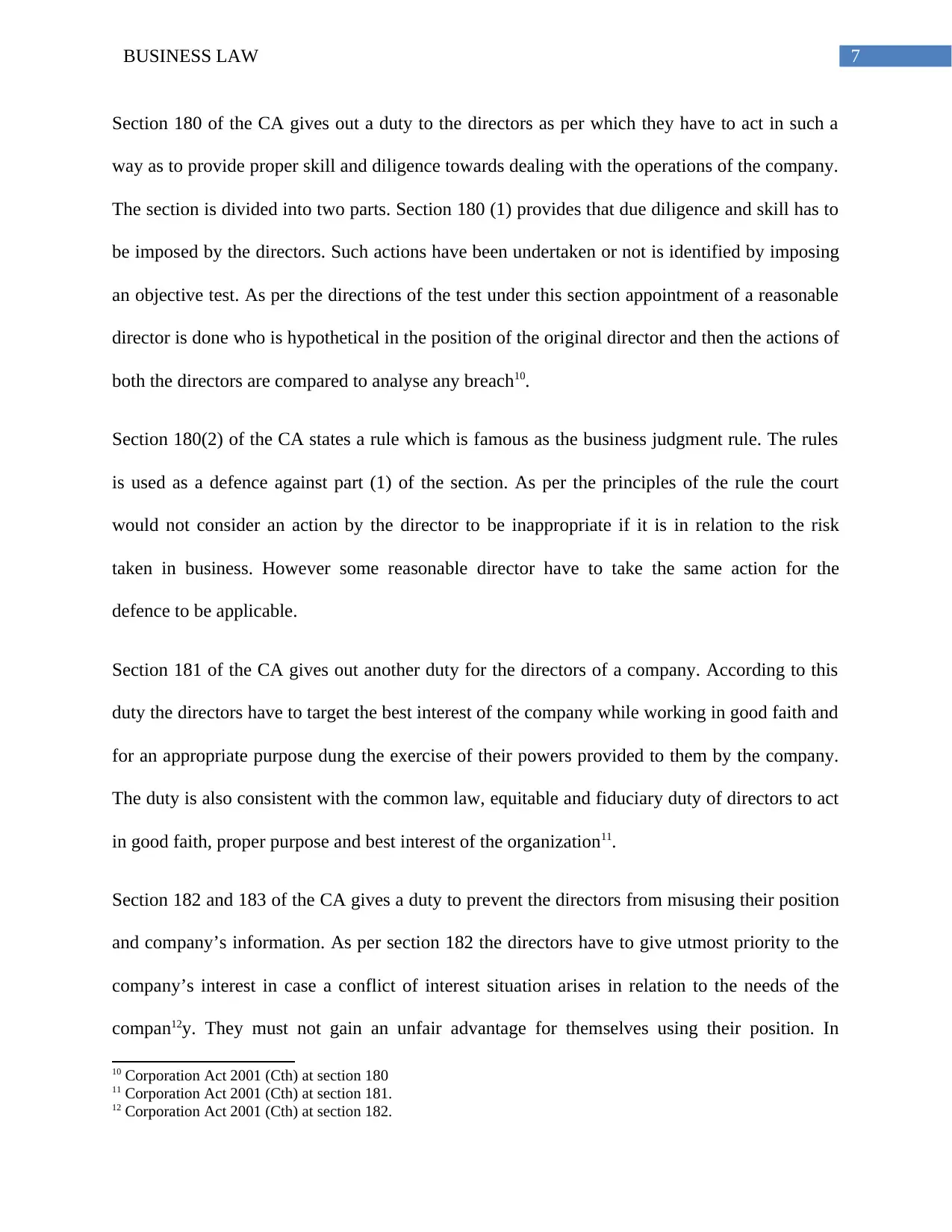
7BUSINESS LAW
Section 180 of the CA gives out a duty to the directors as per which they have to act in such a
way as to provide proper skill and diligence towards dealing with the operations of the company.
The section is divided into two parts. Section 180 (1) provides that due diligence and skill has to
be imposed by the directors. Such actions have been undertaken or not is identified by imposing
an objective test. As per the directions of the test under this section appointment of a reasonable
director is done who is hypothetical in the position of the original director and then the actions of
both the directors are compared to analyse any breach10.
Section 180(2) of the CA states a rule which is famous as the business judgment rule. The rules
is used as a defence against part (1) of the section. As per the principles of the rule the court
would not consider an action by the director to be inappropriate if it is in relation to the risk
taken in business. However some reasonable director have to take the same action for the
defence to be applicable.
Section 181 of the CA gives out another duty for the directors of a company. According to this
duty the directors have to target the best interest of the company while working in good faith and
for an appropriate purpose dung the exercise of their powers provided to them by the company.
The duty is also consistent with the common law, equitable and fiduciary duty of directors to act
in good faith, proper purpose and best interest of the organization11.
Section 182 and 183 of the CA gives a duty to prevent the directors from misusing their position
and company’s information. As per section 182 the directors have to give utmost priority to the
company’s interest in case a conflict of interest situation arises in relation to the needs of the
compan12y. They must not gain an unfair advantage for themselves using their position. In
10 Corporation Act 2001 (Cth) at section 180
11 Corporation Act 2001 (Cth) at section 181.
12 Corporation Act 2001 (Cth) at section 182.
Section 180 of the CA gives out a duty to the directors as per which they have to act in such a
way as to provide proper skill and diligence towards dealing with the operations of the company.
The section is divided into two parts. Section 180 (1) provides that due diligence and skill has to
be imposed by the directors. Such actions have been undertaken or not is identified by imposing
an objective test. As per the directions of the test under this section appointment of a reasonable
director is done who is hypothetical in the position of the original director and then the actions of
both the directors are compared to analyse any breach10.
Section 180(2) of the CA states a rule which is famous as the business judgment rule. The rules
is used as a defence against part (1) of the section. As per the principles of the rule the court
would not consider an action by the director to be inappropriate if it is in relation to the risk
taken in business. However some reasonable director have to take the same action for the
defence to be applicable.
Section 181 of the CA gives out another duty for the directors of a company. According to this
duty the directors have to target the best interest of the company while working in good faith and
for an appropriate purpose dung the exercise of their powers provided to them by the company.
The duty is also consistent with the common law, equitable and fiduciary duty of directors to act
in good faith, proper purpose and best interest of the organization11.
Section 182 and 183 of the CA gives a duty to prevent the directors from misusing their position
and company’s information. As per section 182 the directors have to give utmost priority to the
company’s interest in case a conflict of interest situation arises in relation to the needs of the
compan12y. They must not gain an unfair advantage for themselves using their position. In
10 Corporation Act 2001 (Cth) at section 180
11 Corporation Act 2001 (Cth) at section 181.
12 Corporation Act 2001 (Cth) at section 182.
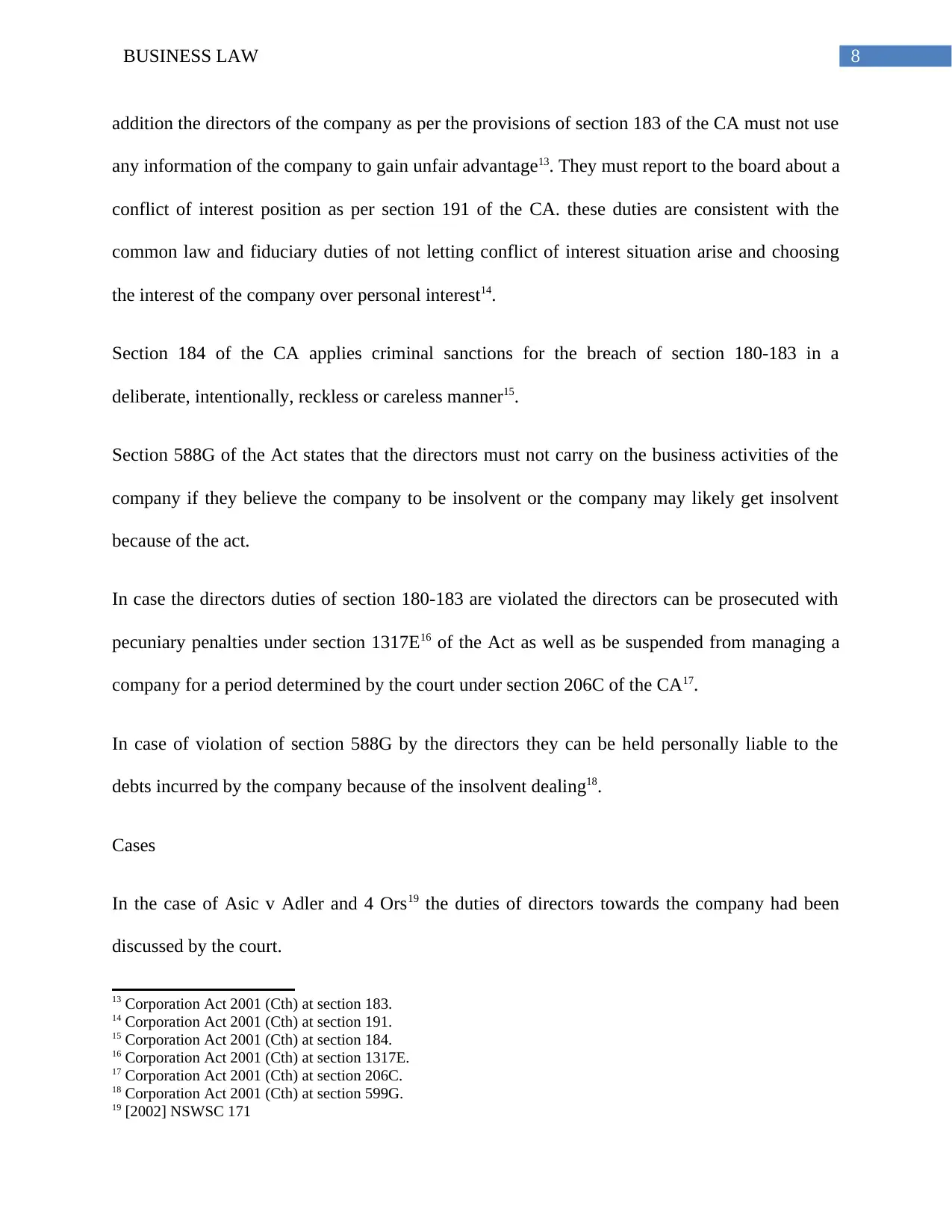
8BUSINESS LAW
addition the directors of the company as per the provisions of section 183 of the CA must not use
any information of the company to gain unfair advantage13. They must report to the board about a
conflict of interest position as per section 191 of the CA. these duties are consistent with the
common law and fiduciary duties of not letting conflict of interest situation arise and choosing
the interest of the company over personal interest14.
Section 184 of the CA applies criminal sanctions for the breach of section 180-183 in a
deliberate, intentionally, reckless or careless manner15.
Section 588G of the Act states that the directors must not carry on the business activities of the
company if they believe the company to be insolvent or the company may likely get insolvent
because of the act.
In case the directors duties of section 180-183 are violated the directors can be prosecuted with
pecuniary penalties under section 1317E16 of the Act as well as be suspended from managing a
company for a period determined by the court under section 206C of the CA17.
In case of violation of section 588G by the directors they can be held personally liable to the
debts incurred by the company because of the insolvent dealing18.
Cases
In the case of Asic v Adler and 4 Ors19 the duties of directors towards the company had been
discussed by the court.
13 Corporation Act 2001 (Cth) at section 183.
14 Corporation Act 2001 (Cth) at section 191.
15 Corporation Act 2001 (Cth) at section 184.
16 Corporation Act 2001 (Cth) at section 1317E.
17 Corporation Act 2001 (Cth) at section 206C.
18 Corporation Act 2001 (Cth) at section 599G.
19 [2002] NSWSC 171
addition the directors of the company as per the provisions of section 183 of the CA must not use
any information of the company to gain unfair advantage13. They must report to the board about a
conflict of interest position as per section 191 of the CA. these duties are consistent with the
common law and fiduciary duties of not letting conflict of interest situation arise and choosing
the interest of the company over personal interest14.
Section 184 of the CA applies criminal sanctions for the breach of section 180-183 in a
deliberate, intentionally, reckless or careless manner15.
Section 588G of the Act states that the directors must not carry on the business activities of the
company if they believe the company to be insolvent or the company may likely get insolvent
because of the act.
In case the directors duties of section 180-183 are violated the directors can be prosecuted with
pecuniary penalties under section 1317E16 of the Act as well as be suspended from managing a
company for a period determined by the court under section 206C of the CA17.
In case of violation of section 588G by the directors they can be held personally liable to the
debts incurred by the company because of the insolvent dealing18.
Cases
In the case of Asic v Adler and 4 Ors19 the duties of directors towards the company had been
discussed by the court.
13 Corporation Act 2001 (Cth) at section 183.
14 Corporation Act 2001 (Cth) at section 191.
15 Corporation Act 2001 (Cth) at section 184.
16 Corporation Act 2001 (Cth) at section 1317E.
17 Corporation Act 2001 (Cth) at section 206C.
18 Corporation Act 2001 (Cth) at section 599G.
19 [2002] NSWSC 171
⊘ This is a preview!⊘
Do you want full access?
Subscribe today to unlock all pages.

Trusted by 1+ million students worldwide
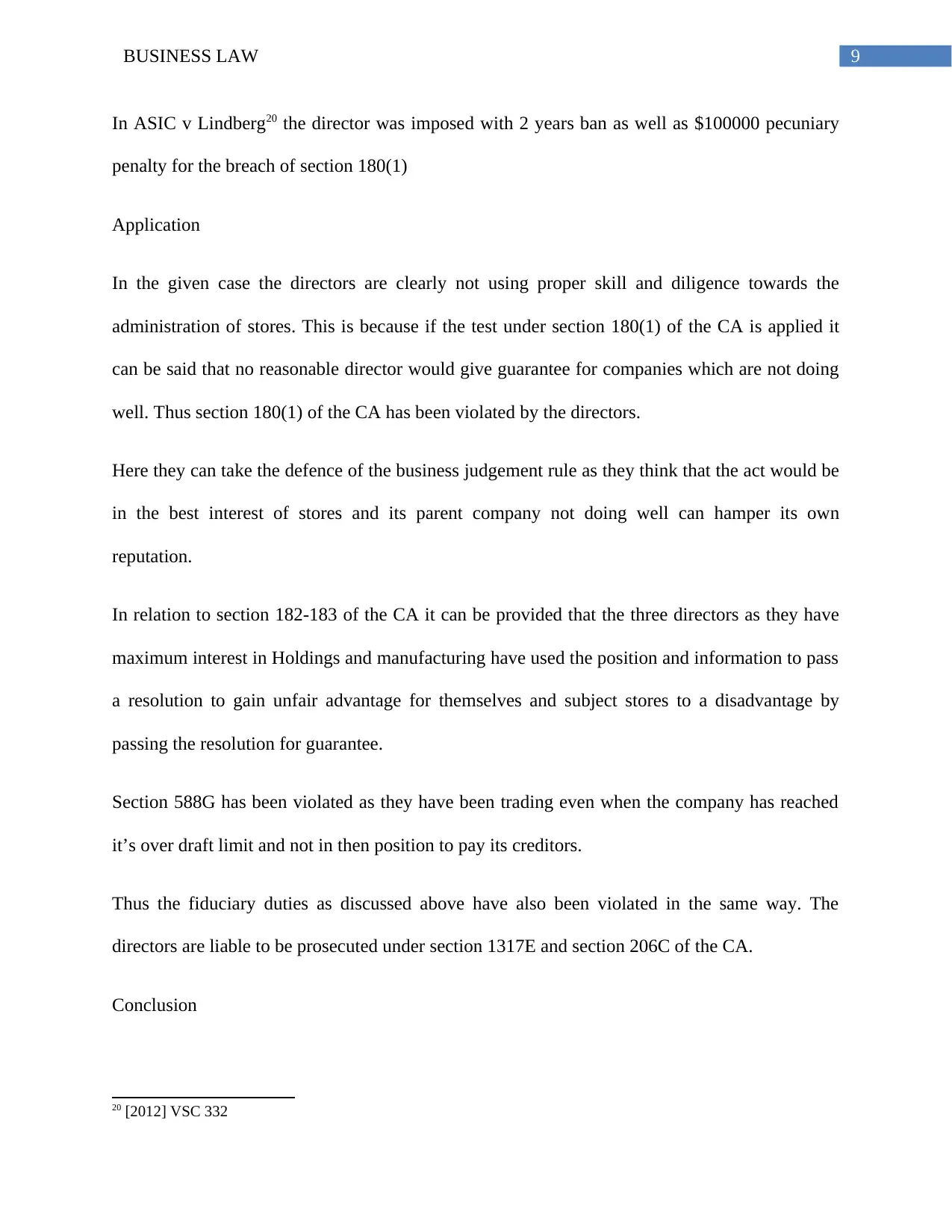
9BUSINESS LAW
In ASIC v Lindberg20 the director was imposed with 2 years ban as well as $100000 pecuniary
penalty for the breach of section 180(1)
Application
In the given case the directors are clearly not using proper skill and diligence towards the
administration of stores. This is because if the test under section 180(1) of the CA is applied it
can be said that no reasonable director would give guarantee for companies which are not doing
well. Thus section 180(1) of the CA has been violated by the directors.
Here they can take the defence of the business judgement rule as they think that the act would be
in the best interest of stores and its parent company not doing well can hamper its own
reputation.
In relation to section 182-183 of the CA it can be provided that the three directors as they have
maximum interest in Holdings and manufacturing have used the position and information to pass
a resolution to gain unfair advantage for themselves and subject stores to a disadvantage by
passing the resolution for guarantee.
Section 588G has been violated as they have been trading even when the company has reached
it’s over draft limit and not in then position to pay its creditors.
Thus the fiduciary duties as discussed above have also been violated in the same way. The
directors are liable to be prosecuted under section 1317E and section 206C of the CA.
Conclusion
20 [2012] VSC 332
In ASIC v Lindberg20 the director was imposed with 2 years ban as well as $100000 pecuniary
penalty for the breach of section 180(1)
Application
In the given case the directors are clearly not using proper skill and diligence towards the
administration of stores. This is because if the test under section 180(1) of the CA is applied it
can be said that no reasonable director would give guarantee for companies which are not doing
well. Thus section 180(1) of the CA has been violated by the directors.
Here they can take the defence of the business judgement rule as they think that the act would be
in the best interest of stores and its parent company not doing well can hamper its own
reputation.
In relation to section 182-183 of the CA it can be provided that the three directors as they have
maximum interest in Holdings and manufacturing have used the position and information to pass
a resolution to gain unfair advantage for themselves and subject stores to a disadvantage by
passing the resolution for guarantee.
Section 588G has been violated as they have been trading even when the company has reached
it’s over draft limit and not in then position to pay its creditors.
Thus the fiduciary duties as discussed above have also been violated in the same way. The
directors are liable to be prosecuted under section 1317E and section 206C of the CA.
Conclusion
20 [2012] VSC 332
Paraphrase This Document
Need a fresh take? Get an instant paraphrase of this document with our AI Paraphraser
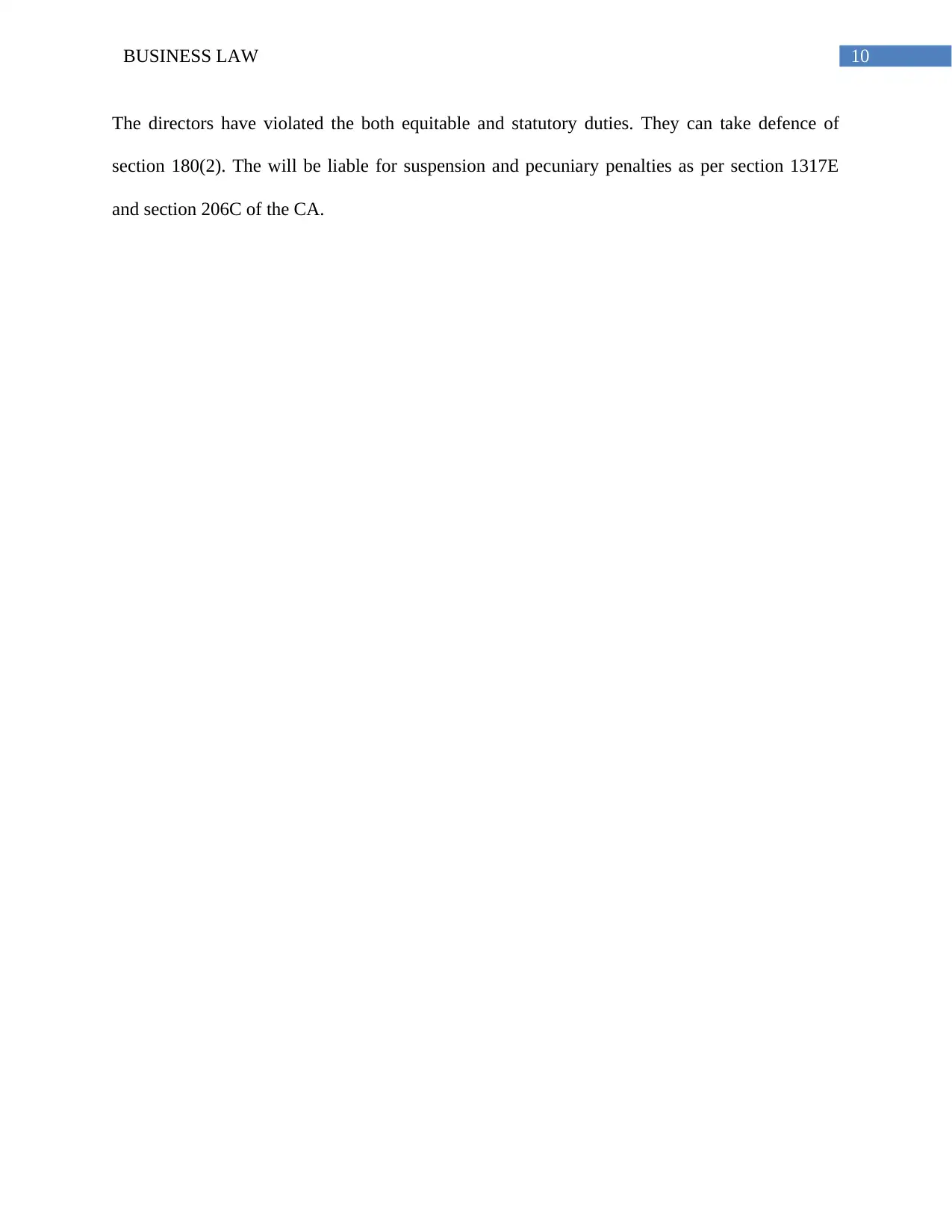
10BUSINESS LAW
The directors have violated the both equitable and statutory duties. They can take defence of
section 180(2). The will be liable for suspension and pecuniary penalties as per section 1317E
and section 206C of the CA.
The directors have violated the both equitable and statutory duties. They can take defence of
section 180(2). The will be liable for suspension and pecuniary penalties as per section 1317E
and section 206C of the CA.
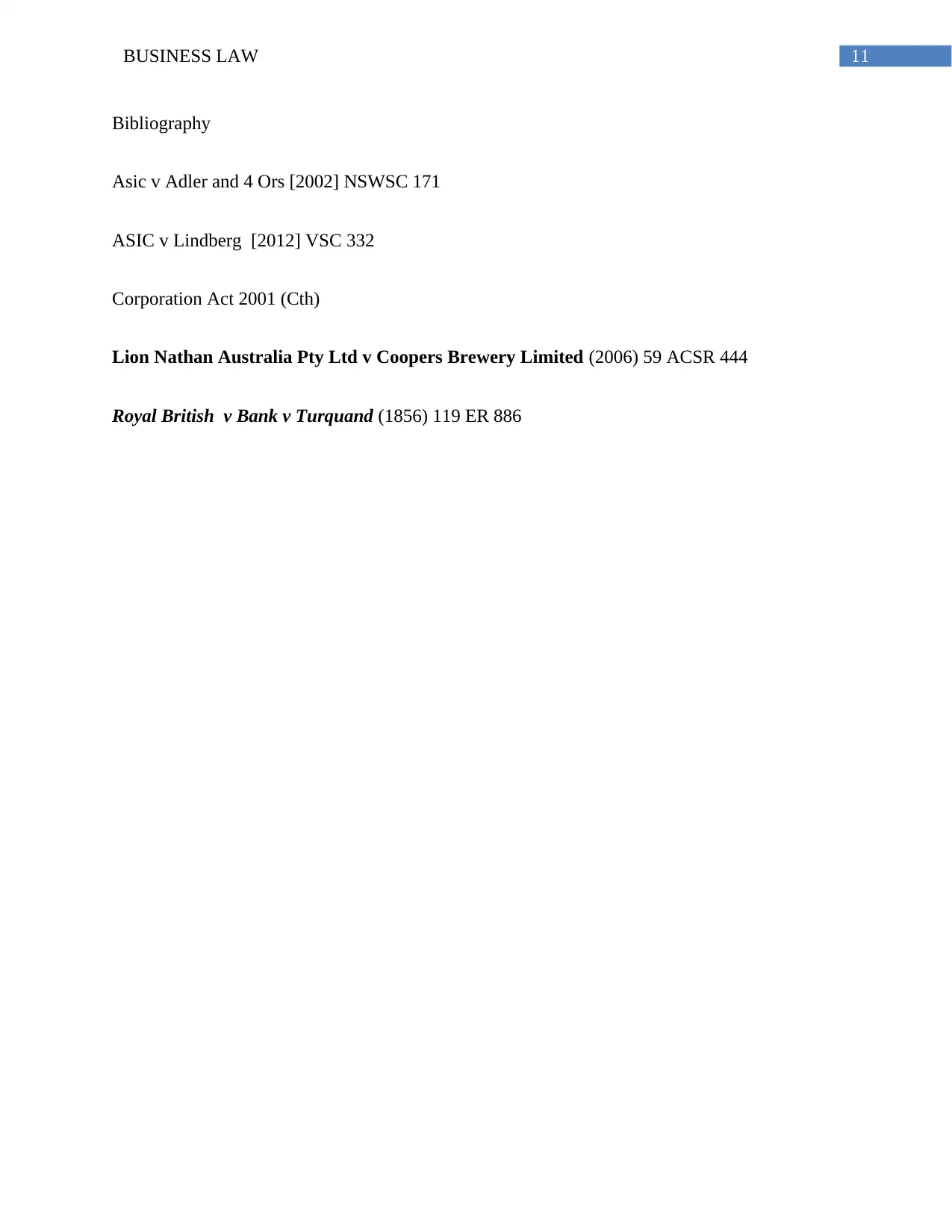
11BUSINESS LAW
Bibliography
Asic v Adler and 4 Ors [2002] NSWSC 171
ASIC v Lindberg [2012] VSC 332
Corporation Act 2001 (Cth)
Lion Nathan Australia Pty Ltd v Coopers Brewery Limited (2006) 59 ACSR 444
Royal British v Bank v Turquand (1856) 119 ER 886
Bibliography
Asic v Adler and 4 Ors [2002] NSWSC 171
ASIC v Lindberg [2012] VSC 332
Corporation Act 2001 (Cth)
Lion Nathan Australia Pty Ltd v Coopers Brewery Limited (2006) 59 ACSR 444
Royal British v Bank v Turquand (1856) 119 ER 886
⊘ This is a preview!⊘
Do you want full access?
Subscribe today to unlock all pages.

Trusted by 1+ million students worldwide
1 out of 12
Related Documents
Your All-in-One AI-Powered Toolkit for Academic Success.
+13062052269
info@desklib.com
Available 24*7 on WhatsApp / Email
![[object Object]](/_next/static/media/star-bottom.7253800d.svg)
Unlock your academic potential
Copyright © 2020–2026 A2Z Services. All Rights Reserved. Developed and managed by ZUCOL.





